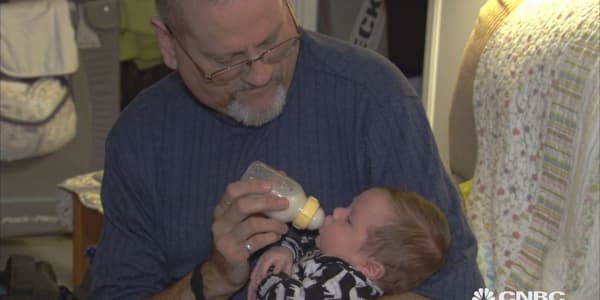The largest cosmetics companies produce millions of products every year that go from manufacturing facilities directly onto store shelves and into our homes, with little to no government review. But after more than a hundred years of self-regulation, that luxury is being threatened.
The reason: Lawmakers are seeking to tighten the regulatory framework for the near-$100 billion cosmetics industry after rising concern over bad reactions to makeup, hair dyes and fragrances, along with the possibility that some of the chemical contents within their products could cause long-term health risks.
As a result, for the first time, the Food and Drug Administration is launching a survey of safety practices and manufacturing standards targeting the cosmetics industry and taking a detailed look at a sector that includes an estimated 900 companies.
An investigation long overdue
Environmental health advocates say scrutiny of the cosmetics sector is long overdue. "It's hard to think of a category that is less regulated [than cosmetics]. ... Even pesticides have more," said Scott Faber, senior vice president for government affairs at the Environmental Watch Group.
The only government oversight of cosmetics companies comes under the Federal Food, Drug and Cosmetic Act, passed in 1938. The act is focused mainly on regulating adulterated or misbranded products, or products that are falsely packaged. However, labeling products as natural or organic does not qualify as misbranding. The 1938 act also does not require the FDA to recall potentially dangerous items or monitor the ingredients used in products.
Self-policing its products has been the standard for the cosmetics sector. The Personal Care Products Council, a cosmetic industry advocacy group that represents 600 companies engaged in the manufacture, distribution and supply of cosmetics products, has existed for more than 100 years and funds its own self-regulatory body. The one exception to self-regulation is color additives, because some synthetic colors are made of coal tar and contain lead.
Lisa Powers, spokeswoman for the Personal Care Products Council, said the Cosmetic Ingredient Review, a third-party review body funded by the industry, is "independent from the PCPC and the cosmetics industry." This organization is trusted by the industry to study the chemicals in products and to "help keep cosmetics safe."
Faber of the Environmental Watch Group dismissed it as a "fake police force," with no authority over bad actors in the industry. "Self-policing has failed," he said. And with a surge in imports from China, whose products are liable to be contaminated, and the growing popularity of makeup use at younger ages, implementing new regulations and legislation is more important. The European Union has already banned 1,328 chemicals from cosmetics — including propylparaben, and quaternium-15, which is used in a variety of hair products and lotions — and has required premarket safety assessments, mandatory registration and government authorization for the use of materials.
Short-term and long-term health concerns growing
Health side effects related to chemicals used in cosmetics have been identified by recent studies. And some companies have damaged the industry's reputation in recent years. The most notorious case was WEN hair-care products. The hair products line was endorsed by celebrities and even had Brooke Shields as its face in 2015. By 2016 more than 21,000 complaints had been made against the company, something the FDA discovered when it began investigating. The agency had received close to 1,400 adverse event reports directly, with users claiming they were victims of itchy scalps, rashes and suffering from hair loss, hair breakage and balding. The FDA is still investigating but has no authority to recall the product unless the manufacturer voluntarily agrees to do so. As of last November, the FDA had not determined a cause for the adverse events reported.
The WEN products are still available for purchase and are manufactured in the United States. Its parent company, Guthy-Renker, declined to comment. It settled a class-action lawsuit for $26 million in 2016 and at that time said its products were safe and it settled due to the costs and time commitments of litigation.
A study conducted at the Center for Environmental Research and Children's Health at the University of California-Berkeley documented changes in teens' urine test after refraining from using their personal care products. After three days, urine tests showed significant decreases in several artificial chemicals, including parabens. Parabens are commonly used as preservatives in cosmetic products, usually to prevent the growth of mold. Although parabens are also found in baked and processed goods, they are found at much greater levels in cosmetics. According to the American Cancer Society, studies have shown parabens have weak estrogen-like properties, and a study from 2004 found traces of parabens in breast cancer samples. There has not been any direct evidence that parabens can cause breast cancer.
It's hard to think of a category that is less regulated [than cosmetics]. Even pesticides have more.Scott Fabersenior vice president for government affairs at the Environmental Watch Group
A study at the U.S National Library of Medicine found that Benzophenone, also known as Oxybenzone, a product that is commonly used in sunscreens as a UV absorber and in lip balm, can lead to the proliferation of human breast cancer cells in the laboratory. Johnson & Johnson's Safety and Care commitment site disclosed using the chemical, but cited a 2015 U.S. Department of Health and Human Services National Toxicology Program that concluded that "within normal use levels" oxybenzone does not have an effect on human hormone levels. Hawaii recently passed legislation that banned companies from selling sunscreen on the island that included oxybenzone and octinoxate, however, health concerns were not the reason: the state was concerned about harmful effect on its marine environment and coral reefs to which the chemical has been linked.
Kimberly Berger, research scientist at the Center for Environmental Research and Children's Health at UC Berkeley, said that the average teenage girl uses 14 personal-care products a day. "We have a responsibility to study these chemicals in these cosmetics to find out if any of them are harmful to us and to make that information available to the public." Berger said many labels don't list the actual chemical names of artificial fragrances, instead calling them "fragrance" or "parfum."
The WEN headlines led a team of Northwestern University researchers to review an FDA database of complaints made between 2004 and 2016. The FDA received, on average, 396 cosmetic-related complaints per year, but there were big increases in 2015 and 2016, mostly due to WEN. Hair-care products, skin-care products and tattoos were responsible for the majority of complaints. Personal cleanliness products, hair care and hair-coloring products were associated with serious health problems.
The Northwestern research team wrote in a 2017 JAMA Internal Medicine article, "Better cosmetic surveillance is needed given their ubiquity and lack of a premarket approval pathway. Unlike devices, pharmaceuticals, and dietary supplements, cosmetic manufacturers have no legal obligation to forward adverse events to the FDA."
Driven largely by the rising number of health-conscious consumers and the demand for clean label products, demand for products that are free from synthetic fragrances, preservatives, parabens, petrochemicals and harsh cleaners such as sodium lauryl sulfate has seen a huge uptick over the past few years. As a result, the global natural and organic beauty market has been exploding. According to a June report released by market research firm Grand View Research, the global organic personal care market is projected to reach $25.11 billion by 2025, up from $12.9 billion in 2017. Rising R&D expenditure to introduce improved plant and animal extracts into various products is expected to promote the demand for organic personal-care products over the forecast period, said the report. It also stated that regulations encouraging the use of organic materials in the personal-care industry are likely to propel market growth.
Congress has been considering cosmetics legislation, but efforts have slowed
Congress has been taking a look at new regulation of the cosmetics industry, though competing proposals have been floated. In May 2017, California Democratic Sen. Dianne Feinstein and Maine Republican Sen. Susan Collins introduced the bipartisan Personal Care Products Safety Act. In October, Utah Republican Sen. Orrin Hatch introduced the competing FDA Cosmetic Safety and Modernization Act. Both bills include mandatory reporting, registration of cosmetic facilities and ingredient review from the FDA. However, only the Feinstein-Collins bill would give the FDA the authority to order mandatory recalls and conduct annual investigations on the safety of five cosmetic contaminants: methylene glycol (a form of formaldehyde and a recognized carcinogen), propylparaben, lead acetate, diazolidinyl urea and quaternium-15. Lead acetate already has been banned by the European Union.
The Feinstein-Collins bill also proposes that the largest cosmetics manufacturers collectively provide the FDA with $20 million so the agency has the resources needed to keep consumers safe. The bill also requires ingredient reporting, which the Hatch bill does not. Both bills are currently stuck in the Senate's Committee on Health, Education, Labor, and Pensions. The Feinstein-Collins legislation has been endorsed not only by the Environmental Watch Group and the American Cancer Society but a number of large cosmetic and consumer products brands, including L'Oréal, Johnson & Johnson, Procter and Gamble and Unilever. Procter and Gamble and Unilever spokespeople confirmed their support for legislation, as well as their commitment to PCPC. Johnson & Johnson, Unilever, Procter & Gamble and L'Oréal are all PCPC member companies.
The PCPC is supporting Hatch's bill. "We look forward to continuing that work with Senator Hatch … [and] sponsors of similar legislation, including Senators Feinstein and Collins," Powers said.




